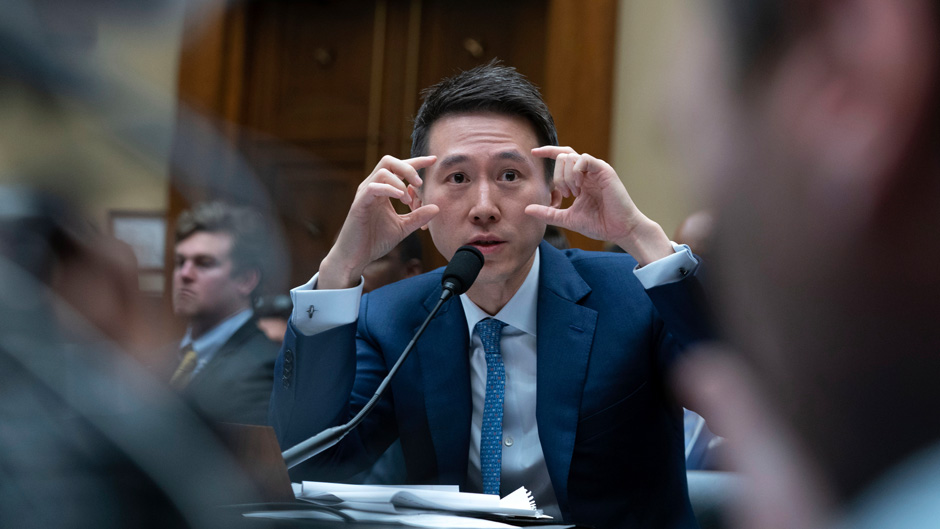Shou Zi Chew, chief executive officer of TikTok, spent five hours last week in grueling congressional hearings attempting to convince legislators that the platform serves as a boon for entrepreneurs and an entertainment vehicle and presents no threat to U.S. national security.
Yet Chew’s testimony, which resonates within the current anti-China and anti-big tech atmosphere, failed to convince legislators who—in an unfamiliar show of political unison—appear ready to force the Chinese-owned company to sell its U.S. operations or face a ban.
Yelena Yesha and Stephen Dennis, both specialists with the University of Miami Institute for Data Science and Computing (IDSC), and Chinese scholar June Teufel Dreyer support that decision.

“At this point, it’s not clear that the Chinese government has any influence, but they’re just one click away from having it,” said Yesha, professor, innovation officer, and Knight Foundation Endowed Chair with IDSC.
“We don’t know their strategy—and it may be they have none and are just being conservative—but their longer-term strategy may be to collect as much information as possible (on U.S. users), to personalize and tweak it and use it for brainwashing disinformation and any other tactics that can actually influence elections or democracy in our country,” Yesha added.
“TikTok’s real problem is that its Chinese parent company [ByteDance] operates in an environment that lacks rule of law and under a government that is known to be obsessed with data and is widely suspected of collecting it on U.S. citizens,” said Dreyer, a political science professor in the College of Arts and Sciences. “So, TikTok is being undercut abroad by its authoritarian home government.”
Dreyer referenced a 2017 law enacted by the People’s Republic of China mandating that when party/government ask companies and individuals to provide data, they must do so or face unspecified punishments. “So TikTok will have to turn over users’ data,” Dreyer noted.
Dennis, a professor of practice with IDSC, emphasized that most TikTok users ignore the terms and conditions for use and grant access to a vast swath of personal information: phone number and contacts, access to camera and microphone when making a video, email address, IP address (an indication of location), keystroke patterns (used for authentication), access to other mobile apps, ad ID which is used for geofencing, advertisements, interests associated with demographics, gender behavior, device information, birthday, other videos you watch in their environment, the accounts you follow, and private messaging on the app, among others.
Yesha noted that TikTok doesn’t appear to collect more information than other traditional social media sites, yet it’s the only technology platform controlled by an autocratic government—a scenario that creates homeland security implications.

While the data may appear to be innocuous or harmless in segmented form, in aggregate and in the hands of an autocratic regime it’s far more risky, the specialists agreed.
“In large degree, TikTok users are young people who are innocently sharing all kinds of private information, yet some of these people will one day become government employees with security clearances,” Dennis noted.
“Influence is a big problem,” he continued. “The ability to pre-bias judgment, to understand behaviors and how to segment and control thoughts can be really important from a national security perspective, whether it’s influencing election outcomes, or your predisposition to some national security concerns or in respect to communism—all these can be used for a sort of indoctrination.”
The Committee on Foreign Investment in the United States (CFIUS), an interagency of the U.S. Department of Treasury, is essentially tasked with assessing TikTok’s risk factor for the U.S.
CFIUS is currently monitoring the negotiations between TikTok and American-owned Oracle as part of “Project Texas,” TikTok’s plan for a storage mechanism for U.S. data that would purportedly be safeguarded from Chinese government influence.
The devil is in the data details in terms of determining whether TikTok can or will keep the data separate, the data specialists suggested.
“The principal problem in this scenario is the data governance,” Yesha said. “There’s no wrongdoing to point to at this point, but it can happen at any time. It’s a sense that we have a kind of enemy sleeping in our backyard.”
Dreyer suggested that a plan be proposed to sell the company and have a group of American cyber experts monitor its operations here in the U.S.
Both Yesha and Dennis noted that social media platforms in general have come under increasing criticism for a range of factors—cyberbullying, social anxiety, depression, exposure to content that is not age appropriate, and obsession with screen use, especially for young teens.
“We find ourselves with an extreme case. The perceived consequences with this platform are higher than with the others,” Dennis noted.
While both specialists recognize TikTok’s highly successful business model and that a number of factors are at play in terms of any ban or forced sale, they prioritized the concern for national security.
“If we believe it’s a matter of national security, then we should do what’s right for the country. But this main question is not clear—that’s something regulators have to define,” Yesha said.
Dennis supports a forced sale or, even better, suggested that the Chinese enable ByteDance to sell TikTok.
“There’s no need for the Chinese government to exert control over a private company. So instead of killing it, making users upset, creating unrest, creating discomfort in the social media community, just let TikTok keep operating—but protect our interests by forcing the sale,” Dennis urged.

